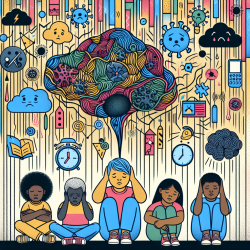Introduction
Noise-induced hearing loss (NIHL) is a prevalent issue that affects millions of individuals worldwide, including children. A recent study titled "Unexpected Consequences of Noise-Induced Hearing Loss: Impaired Hippocampal Neurogenesis, Memory, and Stress" sheds light on the broader implications of NIHL, particularly its impact on hippocampal function, memory, and stress levels. As practitioners dedicated to improving children's outcomes, understanding these findings can significantly enhance our therapeutic approaches.
The Study's Findings
The research highlights several critical outcomes of NIHL:
- Impaired Hippocampal Neurogenesis: The hippocampus, crucial for memory and spatial navigation, continues to generate new neurons in adulthood. However, NIHL disrupts this process, leading to long-term structural changes and memory deficits.
- Memory Deficits: Chronic noise exposure impairs both working and reference memory, as evidenced by difficulties in spatial navigation tasks in animal models.
- Increased Stress Levels: NIHL causes prolonged stress responses, indicated by elevated corticosterone levels, which further suppress neurogenesis and exacerbate memory issues.
Implications for Practitioners
These findings have significant implications for speech-language pathologists and other practitioners working with children:
1. Early Intervention and Prevention
Given the long-term impact of NIHL on cognitive functions, early intervention is crucial. Practitioners should advocate for noise reduction strategies in schools and homes, such as:
- Using noise-canceling headphones
- Implementing quiet zones in classrooms
- Educating parents and teachers about the risks of prolonged exposure to loud noises
2. Comprehensive Assessments
Incorporate assessments that evaluate not only auditory processing but also memory and stress levels. Tools like the Working Memory Rating Scale (WMRS) and stress questionnaires can provide a holistic view of the child's cognitive and emotional state.
3. Tailored Therapeutic Approaches
Design therapy sessions that address both hearing and cognitive deficits. Techniques such as auditory training combined with memory-enhancing activities (e.g., spatial navigation games) can be beneficial.
4. Collaboration with Other Professionals
Work closely with audiologists, psychologists, and educators to create a multidisciplinary approach to managing NIHL and its associated cognitive and emotional impacts.
Encouraging Further Research
The study opens several avenues for further research. Practitioners can contribute to the field by exploring:
- The effectiveness of different therapeutic interventions in mitigating the cognitive impacts of NIHL
- The long-term outcomes of early intervention strategies
- The role of environmental modifications in reducing noise exposure and its effects
Conclusion
The unexpected consequences of NIHL underscore the importance of a proactive and comprehensive approach to managing hearing loss in children. By integrating the study's findings into our practice, we can better support children's cognitive and emotional development.
To read the original research paper, please follow this link: Unexpected Consequences of Noise-Induced Hearing Loss: Impaired Hippocampal Neurogenesis, Memory, and Stress.










